As of August 15, eight MY 2023 models qualify for the full $7,500 credit, and eight MY 2023 models qualify for the $3,750 credit
Tysons, Va.—Several electric, plug-in hybrid and fuel cell electric vehicles are eligible for a federal income tax credit starting with purchases this year (2023).
Since the latest rules governing EV purchase tax credits (30D) came into effect on April 18, the list of vehicles eligible for the purchase tax credit has changed. As of August 15, eight MY 2023 models qualify for the full $7,500 credit, and eight MY 2023 models qualify for the $3,750 credit. In addition, four MY 2024 models will also qualify, three at $7,500 and one at $3,750.
To obtain the credit, consumers and dealers do not need to know the qualifying factors (including battery and mineral content and assembly location). The relevant information they do need includes: whether that vehicle qualifies for a tax credit (and if it receives the full $7,500 or the half credit of $3,750), the vehicle’s MSRP and the consumer’s modified adjusted gross income.
With dealer input, NADA is advocating for a VIN search program, so that they and consumers can easily verify which vehicles qualify.
MY 2023 models qualifying for the full $7,500 credit:
- Cadillac Lyriq
- Chevrolet Bolt
- Chrysler Pacifica (PHEV)
- Ford F-150 Lightning
- Lincoln Aviator Grand Touring (PHEV)
- Tesla Model 3
- Tesla Model Y
- Volkswagen ID.4
MY 2023 models qualifying for $3,750 credit:
- Ford E-Transit
- Ford Escape (PHEV)
- Mustang Mach-E
- Jeep Grand Cherokee (PHEV)
- Jeep Wrangler (PHEV)
- Lincoln Corsair Grand Touring (PHEV)
- Rivian R1S
- Rivian R1T
Additional models qualifying in 2024:
- BMW X5 (PHEV) ($3,750)
- Chevrolet Blazer EV ($7,500)
- Chevrolet Equinox EV ($7,500)
- Chevrolet Silverado EV ($7,500)
There is an additional credit available to purchasers of commercial vehicles, including vehicles purchased by finance companies that are then leased to consumers. Most EV models (including those that do not qualify for the 30D purchase credit) potentially qualify for this credit.
Getting the benefit of this credit is not a tax event for either. The finance source interacts with the IRS to get the credit and then typically uses it to lower the capitalized cost or support the residual value. From the perspective of consumers and dealers, this credit operates like a regular financing incentive.











Comments are closed.